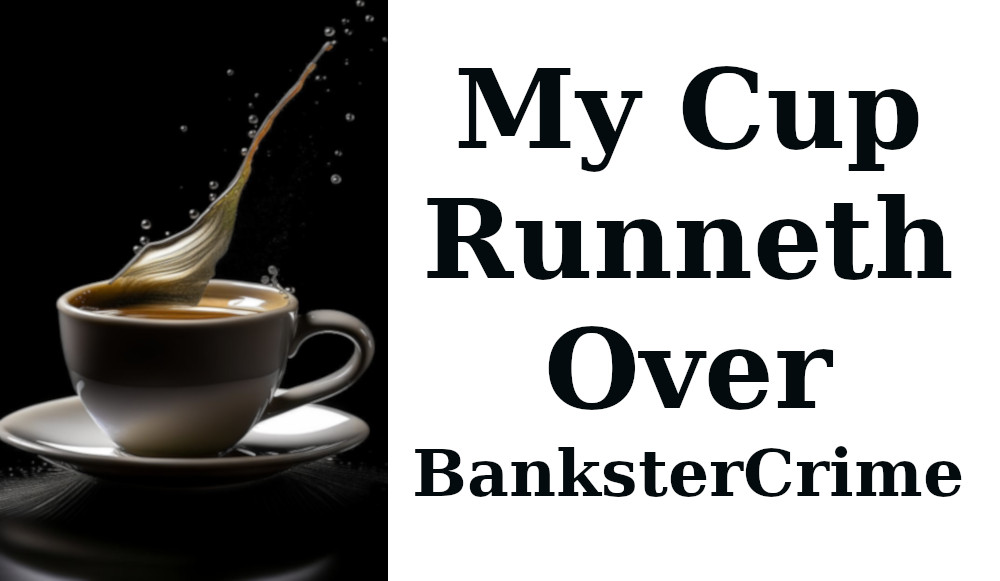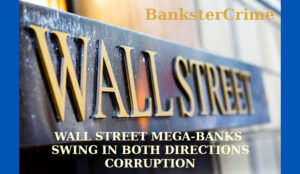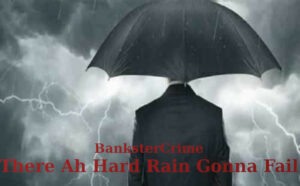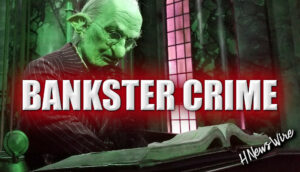
BanksterCrime:
By Pam Martens and Russ Martens,
Jamie Dimon, Chairman and CEO of JPMorgan Chase
On October 27 of last year, JPMorgan Chase filed an 8K form with the Securities and Exchange Commission (SEC) advising that, for the first time ever, its long-tenured Chairman and CEO, Jamie Dimon, and his family, intended to “sell 1 million shares” of his common stock holdings in the bank in 2024.
The news made headlines because an insider selling a large amount of stock in any company – and particularly a bank with JPMorgan Chase’s serial history of running afoul of the law – can be a harbinger of bad news ahead for other shareholders.
Dimon didn’t wait long into 2024 to start dumping stock. JPMorgan Chase filed another SEC form this past February showing that Dimon had sold 821,778 shares of the bank’s common stock for $150,167,222.52, or an average share price of $182.73 – which was suspiciously close to the stock’s all-time high at that point.
Dimon has acquired the bulk of his shares in the same fashion as his former mentor, Sandy Weill, acquired his shares in Citigroup – through stock grants from his hear no evil, see no evil Board of Directors. (Dimon had, in his earlier years, been Weill’s first lieutenant at Citigroup.)
Weill stepped down as CEO of Citigroup in 2003. Just one day after stepping down as CEO, Citigroup’s obliging Board of Directors allowed Weill to sell back to the corporation 5.6 million shares of his Citigroup stock for $264 million. This eliminated Weill’s risk that his big share sale would drive down his own share prices as he was selling. The Board negotiated the price at $47.14 for Weill’s shares. Six years later, in the spring of 2009, Citigroup was a 99-cent stock and receiving the largest taxpayer and Federal Reserve bailout in U.S. history.
Between December 2007 and July 2010, Citigroup received the following bailouts to keep it afloat: The U.S. Treasury injected $45 billion of capital into Citigroup; there was a government guarantee of over $300 billion on certain of its assets; the FDIC provided a guarantee of $5.75 billion on its senior unsecured debt and $26 billion on its commercial paper and interbank deposits; and secret revolving loans from the Federal Reserve sluiced a cumulative $2.5 trillion in below-market-rate loans to Citigroup according to an audit released by the Government Accountability Office in 2011.
On May 9, 2011, Citigroup did a 1 for 10 reverse stock split to dress up the disaster of its share price history. For each 100 shares the shareholder held previously, he or she now owned just 10 shares. Citigroup investors who have held onto their shares since Weill’s stock sale in 2003 are down 87 percent at yesterday’s closing price of $59.68 – which is actually $5.97 adjusted for the reverse stock split.
In spin that is similar to Weill’s tactics, Jamie Dimon has, for more than a decade, attempted to brainwash Congress, the media, and the public at large by referring to his bank as the “Fortress Balance sheet.” His latest letter to shareholders uses the phrase five times – at one point phrasing it as an “unquestionable fortress balance sheet.”
And yet, in the same letter to shareholders, Dimon concedes that his bank’s federal regulators don’t have the same level of confidence in this so-called “Fortress.” Dimon writes that if the capital rules proposed by the FDIC, Office of the Comptroller of the Currency and the Federal Reserve are implemented, they “would increase our firm’s required capital by 25%.”
Another reasonable way to read that is that federal banking regulators, whose bank examiners have intensely examined the books of the bank, believe that JPMorgan Chase is undercapitalized by 25 percent and thus poses a potential systemic risk to the U.S. financial system until it bulks up its capital.
This capital battle is officially known as the proposed Basel III rules and Dimon is leading the charge to stop federal bank regulators from implementing the rules. Internal government documents show that Dimon and his Chief of Staff, Judith Miller, met separately with the following Fed Governors on December 15 to argue against the proposed rules: Fed Governor Adriana Kugler; Fed Vice Chair Philip Jefferson; and Fed Governor Christopher Waller.
According to Fed Chair Jerome Powell’s daily calendar, he met personally with Jamie Dimon on January 26, 2024 from 4:45 p.m. to 5:15 p.m.
Financial Times reporters Joshua Franklin and James Politi report that in mid March, Dimon met in a one-on-one meeting with Vice President Kamala Harris and separately with President Biden’s Chief of Staff, Jeff Zients.
At a Senate Banking Committee hearing on March 7, Senator Elizabeth Warren said that the 37 largest banks that would be impacted by the higher capital rules have “spent tens of millions of dollars running ads during Sunday night football and millions more for an army of lobbyists to try to twist arms here in Congress.”
The TV ads have been grossly misleading, making it sound as if the higher capital requirements at just 37 banks would hurt working families and farmers – ignoring that inadequate capital levels collapsed giant Wall Street banks in 2008 and put millions of innocent Americans out of work and in foreclosure as the U.S. economy collapsed along with the toxic debt bombs exploding at the banks.
Fed Chair Powell was the sole witness at the March 7 Senate Banking hearing. Warren told Powell this:
“Despite all you said last year when the banks failed about supporting Vice Chair Barr’s recommendations to strengthen rules for big banks, public reporting now says that you are driving efforts inside the Fed to weaken the capital rule. You even told the House Financial Services Committee representatives yesterday that you think it’s ‘very plausible’ that you withdraw the rule.”
Warren concluded with this zinger to Powell:
“You are the leader of the Fed and when the heat was on last year, you talked a lot about getting tougher on the banks. But now the giant banks are unhappy about that and you’ve gone weak-kneed on this. The American people need a leader at the Fed who has the courage to stand up to these banks and protect our financial system.”
For more key background on the Basel III capital proposal, see our reports below:
Jamie Dimon Hires Dodd-Frank Hatchet Man to Weigh Suing the Fed Over Proposed Capital Rules


Give the gift of great skin care. Our Soap and Shave Bars are gentle and produce a smooth creamy lather that is nourishing to your skin. They are handmade in small batches. We use only high-quality natural ingredients that you can pronounce. No chemicals, no sodium laurel sulfate, no phthalates, no parabens, no detergents. The set can include Soap Bar, Shave Bar, Shave Brush, and/or Shampoo Bar. These come in a white box and are perfect for your gift giving needs.
Our soaps are made with skin loving ingredients including olive oil, coconut oil, lard, sweet almond oil, shea butter, and castor oil. We do not use palm oil. Scented only lightly with fragrance oils.
The Shave bars give a very close and smooth shave with no razor burn. They leave your skin feeling amazing. A lather can be built up in your hands and then applied to your face, but it is best to use a shaving brush. These bars will only produce a thick foam when used with a shaving brush.
Our Shampoo Bars have a thick lather. A lather can be built up in your hands and then applied to your hair, but it is best to rub the bar gently in your hair. Rinse and repeat.
You choose a scent:
A Thousand Dreams is a whimsical blue scented in a warm mix of fruity and floral notes with peach, peony, lily, musk, sandalwood, and amber.
Bay Rum Spice is a nice masculine scent similar to Old Spice. The scent notes are clove, pine needles, cedarwood, orange, vanilla, and musk.
Birch Woods is a great outdoors-type scent. The notes are bergamot, patchouli, vetiver, and tonka bean.
Cool Clear Water is a refreshing scent. The notes are crisp water, oakmoss, pine, cedar, and musk.
Lavender Champagne has a wonderful scent of Lavender and Champagne and has a light purple color. The scent notes are lavender, sparkling Champagne, grapefruit, orange, thyme, oak, and amber.
Midnight Waters is a moody-mystical scent that opens with fruity notes of red berries, juicy tangerine, and bergamot. Then unfolds into bubbly Champagne, violet flowers, cashmere, amber, and musk.
Raspberry Vanilla is an all-time favorite fragrance for soap. It is a beautiful magenta color. The scent notes are raspberry, strawberry, lemon, coconut, peach, honeysuckle, plum, and vanilla.
Warm Sandalwood is a warm, rich, and woodsy scent. The colors are warm and rich with brown, gold, and white.
A Soap bar will weigh approximately 4 ounces and be approximately 2.25 inches wide by 3.5 inches tall and 1 inch thick. A Shave bar will weigh approximately 3 ounces and be approximately 2.5 inches across and 1.25 inches thick. A Shampoo Bar will weigh approximately 3.5 ounces and be approximately 2.5 inches across and 1.25 inches thick. Please keep in mind that our products are handmade and hand cut. Each bar is unique and might vary slightly in shape, size, design, and color from those pictured.
Please keep your Soap Bars, Shave Bars, and Shampoo Bars well-drained and allow to dry between uses. This will ensure longer lasting bars.
Allergen: Our products contain oil from tree nuts. Please test on a small area of skin prior to use and stop using if irritation occurs. Do not use if you are pregnant. Do not use on infants under the age of 24 months. Do not get in your eyes as it will sting slightly. GoShopping

![]()




